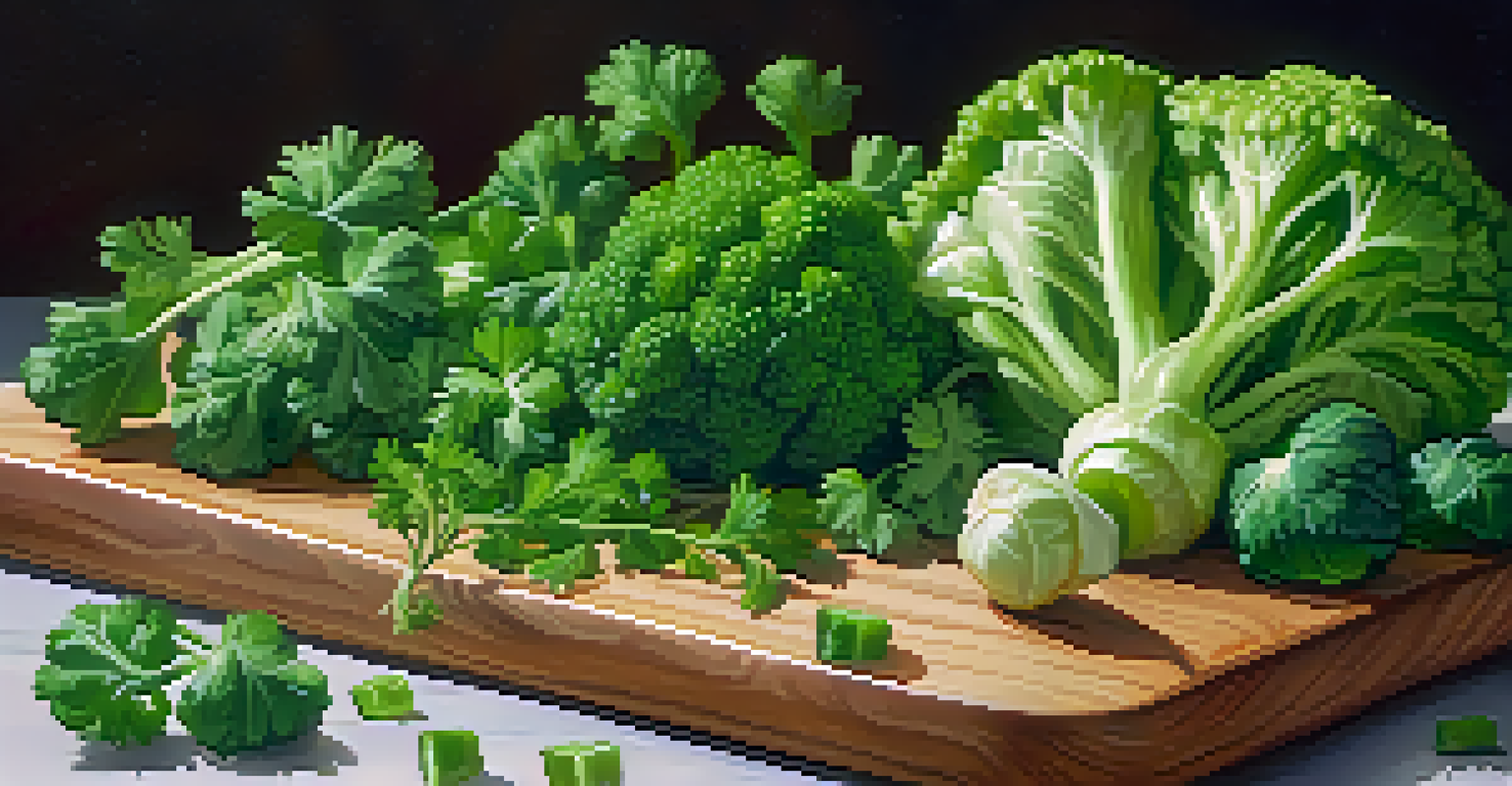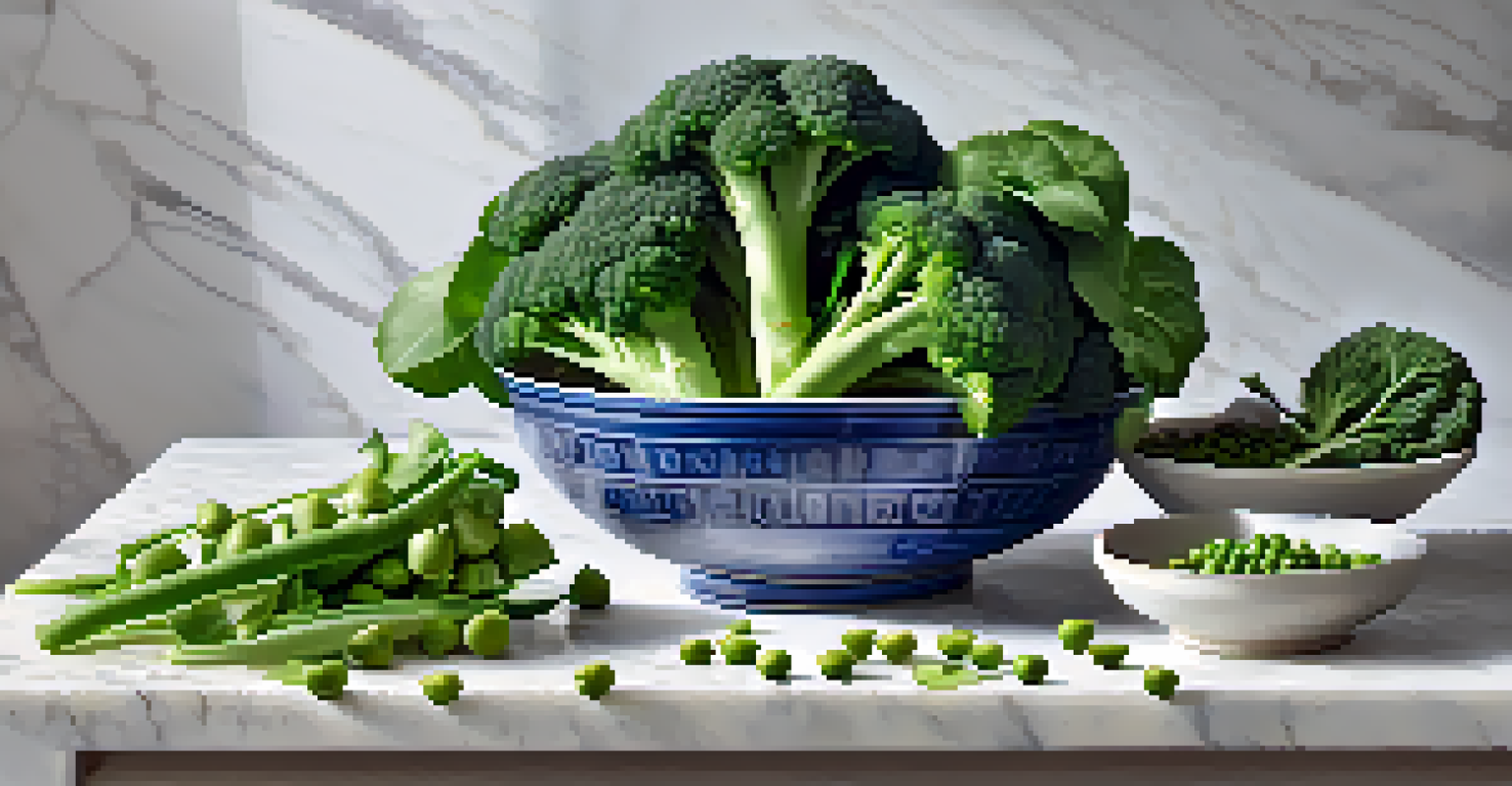The Role of Vitamin K in Raw Foods for Bone Health

What is Vitamin K and Its Importance for Bone Health?
Vitamin K is a fat-soluble vitamin that plays a critical role in bone metabolism and health. It helps in the synthesis of proteins that are necessary for bone formation and mineralization. By regulating calcium levels in the bones and blood, Vitamin K ensures that bones remain strong and less prone to fractures.
Vitamin K is a key player in bone health, ensuring that calcium is directed to the bones where it belongs.
There are two primary forms of Vitamin K: K1 (phylloquinone), found in leafy green vegetables, and K2 (menaquinone), which is present in fermented foods and animal products. While both forms contribute to bone health, K2 is particularly effective in directing calcium to the bones rather than soft tissues, helping to prevent conditions like osteoporosis.
Incorporating Vitamin K-rich foods into your diet can be a simple yet effective way to bolster your bone health. For those opting for a raw food diet, understanding which foods are rich in Vitamin K can enhance the benefits you receive from your meals.
Raw Food Sources of Vitamin K
When it comes to raw foods, leafy greens are your best friends for obtaining Vitamin K. Foods like kale, spinach, and collard greens are not only packed with this nutrient but also offer a host of other vitamins and minerals. A simple salad loaded with these greens can provide a significant boost to your Vitamin K intake.

Other raw food sources include certain vegetables like broccoli, Brussels sprouts, and green peas. These can easily be incorporated into various dishes, from fresh veggie platters to smoothies, maximizing their nutritional value. The key is to eat them raw or lightly cooked to preserve their Vitamin K content.
Vitamin K Supports Bone Health
Vitamin K is essential for bone metabolism, helping in the synthesis of proteins that bind calcium to bones, thereby preventing fractures.
Don’t forget about herbs! Fresh herbs like parsley, cilantro, and basil can elevate your dishes while providing additional Vitamin K. A sprinkle here and there can enhance both flavor and nutrition, making your meals not only healthy but also delicious.
The Mechanism of Vitamin K in Bone Health
Vitamin K is essential for synthesizing osteocalcin, a protein that helps bind calcium to the bone matrix. This process is vital for maintaining bone density and strength, which is especially important as we age. Without sufficient Vitamin K, bones can become weak and brittle, increasing the risk of fractures.
A diet rich in Vitamin K can significantly reduce the risk of osteoporosis and improve overall bone density.
Moreover, Vitamin K plays a role in activating matrix Gla-protein (MGP), which helps prevent calcification of blood vessels and soft tissues. This protective mechanism not only supports bone health but also promotes cardiovascular health by ensuring that calcium is utilized properly in the body.
In essence, Vitamin K acts like a traffic director, guiding calcium to where it's needed most—your bones—while preventing it from accumulating in areas where it could do harm. This dual action underscores the importance of this vitamin in maintaining overall health as well.
How Much Vitamin K Do You Need?
The recommended daily intake of Vitamin K varies by age, sex, and life stage. For adults, the general recommendation is around 90-120 micrograms per day. However, those who are pregnant or breastfeeding may require more, so it's important to adjust your intake accordingly.
While it's beneficial to focus on raw food sources of Vitamin K, it's equally important to maintain a balanced diet that includes a variety of food groups. This ensures you’re not only getting enough Vitamin K but also other essential nutrients that work synergistically for optimal health.
Raw Foods Rich in Vitamin K
Leafy greens like kale and spinach, along with other raw vegetables and herbs, are excellent sources of Vitamin K that can enhance your diet.
If you're concerned about your Vitamin K intake, consider tracking your food consumption for a few days. This can help you identify any gaps in your diet, allowing you to make adjustments as needed to meet your nutritional requirements.
Potential Risks of Vitamin K Deficiency
Vitamin K deficiency is relatively rare but can lead to serious health issues, particularly concerning bone health. A lack of this vitamin can result in decreased bone mineralization, making bones more susceptible to fractures and conditions like osteoporosis.
In addition to bone health, Vitamin K deficiency can impair blood clotting, putting individuals at risk for excessive bleeding from injuries. This can be particularly dangerous for those undergoing surgeries or who have underlying health conditions.
It's crucial to be aware of the signs of deficiency, which may include easy bruising, excessive bleeding, or bone pain. If you suspect you might not be getting enough Vitamin K, consult with a healthcare professional for guidance and potential dietary adjustments.
The Role of Vitamin K in Overall Health
Beyond bone health, Vitamin K has been linked to various other health benefits. Research suggests that it may play a role in reducing the risk of heart disease by preventing arterial calcification. This underscores the importance of maintaining adequate Vitamin K levels for cardiovascular well-being.
Additionally, some studies indicate that Vitamin K may support cognitive function and may even have protective effects against conditions like Alzheimer’s disease. While more research is needed, these potential benefits highlight the diverse roles Vitamin K plays in our health.
Deficiency Risks to Consider
A lack of Vitamin K can lead to serious health issues, including weakened bones and impaired blood clotting, making awareness of intake crucial.
Incorporating Vitamin K-rich raw foods into your diet can have a ripple effect on your overall health, making it a smart addition to your daily meals. Think of it as a small investment in your long-term well-being, one delicious bite at a time.
Tips for Incorporating Vitamin K into Your Diet
To ensure you're getting enough Vitamin K, make it a habit to include a variety of leafy greens in your meals. A green smoothie in the morning or a salad for lunch can be a delicious way to boost your intake. Remember, the more colorful your plate, the more nutrients you're likely to consume!
Experimenting with different raw food recipes can also help diversify your diet. Try adding raw broccoli to your salads or snacking on raw kale chips. Discovering new ways to enjoy these foods can make your meals exciting and beneficial.

Lastly, consider creating a meal plan that incorporates Vitamin K-rich foods throughout the week. Planning your meals can help you stay on track and ensure that you’re nourishing your body with the vitamins it needs for strong bones and overall health.